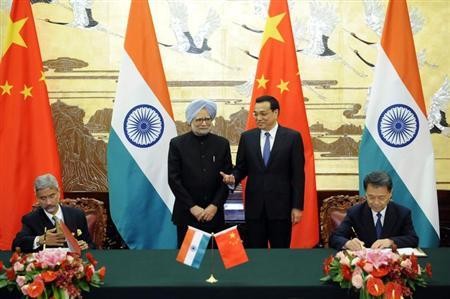
While addressing the youth of China at the Central Party School in Beijing, Indian Prime Minister Manmohan Singh insisted on the future of both the countries be 'defined by cooperation and not confrontation'.
Singh began by drawing parallels between the two countries on the subjects of economic modernisation, socio-economic transformation and political histories.
Keeping the whopping trade deficit of $12 billion with China in mind, he pitched for the youth to invest in India by calling the economic crisis a 'temporary disruption'.
Here are the highlights of his speech and message to the Chinese youth
- The prolonged global economic crisis has affected us, as it has many emerging economies. I believe, however, that this is a temporary disruption. In recent months, we have taken measures to enhance foreign investment flows, speed up implementation of major projects, boost infrastructure development, strengthen our financial markets, reform our tax systems and make our business environment more attractive.
Our effort is to return the Indian economy to a sustained growth rate of 7-8 per cent per annum.
- We need to pay much greater attention to the expansion and modernization of our infrastructure. India plans to invest one trillion US dollars in infrastructure in the next five years and we would welcome China's expertise and investment in this sector.
- We need to increase our agricultural productivity in order to reduce rural-urban disparities in income and manage efficiently the process of mass urbanization, which is a phenomenon common to both our countries. This will mean paying particular attention to the issues of water and waste management.
China has significant experience of urbanization and our national planners, city administrators and entrepreneurs should share experiences and seek solutions in dealing with the physical, social, environmental and human challenges of mobility and urbanization.
- We want to draw upon China's strength in the manufacturing sector, which is vital for providing mass employment. India, for its part, has strength in services, innovation and certain manufacturing sectors, which can benefit China. A linked challenge for India is in skill development, where we can learn from each other's experience.
- We should intensify cooperation on the shared challenges of energy security, including joint development of renewable energy resources, as well as working jointly with third countries.
- Economic success requires a favourable external environment. The emerging global environment may not remain as propitious as it has been in recent decades. We should therefore work together to make the international economic environment more conducive to our development efforts.
- We should also intensify our efforts to support trade and investment and reduce risks in emerging markets.
- We must also confront the challenges of climate change and focus greater attention on the safeguarding of our fragile environment.
- We should ensure that the international response to climate change does not constrain our growth and that it continues to be based on the principle of common but differentiated responsibilities.
- If we look carefully, many of our challenges are common. Similarly, maritime security in the Pacific and Indian Oceans is vital for our economies just as peace and stability in West Asia and Gulf are essential for our energy security.
- Regional stability and prosperity will also gain from stronger connectivity in the Asia-Pacific region. This should be a shared enterprise of India and China.
- We should engage with each other in a spirit of equality and friendship and with the confidence that neither country is a threat to the other. This is the essential premise of India's external engagement. Our strategic partnerships with other countries are defined by our own economic interests, needs and aspirations. They are not directed against China or anyone else. We expect a similar approach from China.
- We should reaffirm an unwavering commitment to the principles of Panchsheel and conduct our relationship in a spirit of mutual respect, sensitivity to each other's interests and sovereignty, and mutual and equal security. India has welcomed President Xi Jinping's concept of a new type of great power relations. This is a contemporary development of the Panchsheel or Five Principles of Peaceful Co-existence, elaborated by Prime Minister Nehru and Premier Zhou Enlai in the 1950s. It highlights, in a modern context, the need for creating inter-state relations among major powers, based on mutual trust, sensitivity to each other's core concerns and a commitment to resolving all outstanding issues through peaceful dialogue. We should develop our relations on the basis of these principles.
- Maintaining peace and tranquility in the India-China border areas has been the cornerstone of our relationship. It is essential for mutual confidence and for the expansion of our relations. We should do nothing to disturb that.
- We should increase consultations and cooperation on complex issues such as trans-border rivers and our trade imbalance so as to strengthen our strategic and cooperative partnership
- We should maintain a high level of strategic communication and consultations, in a spirit of transparency, on our region and our periphery, eliminating misunderstanding between our two countries and building experience of positive cooperation.















